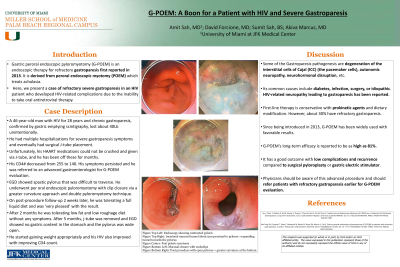Monday Poster Session
Category: Stomach
P2811 - G-POEM: A Boon for a Patient With HIV and Severe Gastroparesis
Monday, October 23, 2023
10:30 AM - 4:15 PM PT
Location: Exhibit Hall

Has Audio

Amit Sah, MD
University of Miami at JFK Medical Center
Lantana, FL
Presenting Author(s)
Amit Sah, MD1, David Forcione, MD2, Sumit Sah, BS3, Akiva Marcus, MD4
1University of Miami at JFK Medical Center, Lantana, FL; 2Baptist Health, Boca Raton, FL; 3American University of the Caribbean, Lantana, FL; 4HCA Florida Physicians, JFK Medical Center, West Palm Beach, FL
Introduction: Gastric peroral endoscopic pyloromyotomy (G-POEM) is an endoscopic therapy for refractory gastroparesis first reported in 2013. It is derived from peroral endoscopic myotomy (POEM) which treats achalasia. Here, we present a case of refractory severe gastroparesis in an HIV patient who developed HIV-related complications due to the inability to take oral antiretroviral therapy.
Case Description/Methods: A 46-year-old man with HIV for 28 years and chronic gastroparesis, confirmed by gastric emptying scintigraphy, lost about 40Lb unintentionally. He had multiple hospitalizations for severe gastroparesis symptoms and eventually had surgical J-tube placement. Unfortunately, his HAART medications could not be crushed and given via J-tube, and he has been off these for months. His CD4# decreased from 255 to 140. His symptoms persisted and he was referred to an advanced gastroenterologist for G-POEM evaluation. EGD showed spastic pylorus that was difficult to traverse. He underwent per oral endoscopic pyloromyotomy with clip closure via a greater curvature approach and double pyloromyotomy technique. On post-procedure follow-up 2 weeks later, he was tolerating a full liquid diet and was ‘very pleased’ with the result. After 2 months he was tolerating low fat and low roughage diet without any symptoms. After 5 months, j-tube was removed and EGD showed no gastric content in the stomach and the pylorus was wide open. He started gaining weight appropriately and his HIV also improved with improving CD4 count.
Discussion: Some of the Gastroparesis pathogenesis are degeneration of the interstitial cells of Cajal (ICC) (the pacemaker cells), autonomic neuropathy, neurohormonal disruption, etc. Its common causes include diabetes, infection, surgery, or idiopathic. HIV-related neuropathy leading to gastroparesis has been reported. First-line therapy is conservative with prokinetic agents and dietary modification. However, about 30% have refractory gastroparesis. management of gastroparesis remains a challenge. Since being introduced in 2013, G-POEM has been widely used with favorable results. G-POEM's long-term efficacy is reported to be as high as 81%. It has a good outcome with low complications and recurrence compared to surgical pyloroplasty or gastric electric stimulator. Physicians should be aware of this advanced procedure and should refer patients with refractory gastroparesis earlier for G-POEM evaluation.

Disclosures:
Amit Sah, MD1, David Forcione, MD2, Sumit Sah, BS3, Akiva Marcus, MD4. P2811 - G-POEM: A Boon for a Patient With HIV and Severe Gastroparesis, ACG 2023 Annual Scientific Meeting Abstracts. Vancouver, BC, Canada: American College of Gastroenterology.
1University of Miami at JFK Medical Center, Lantana, FL; 2Baptist Health, Boca Raton, FL; 3American University of the Caribbean, Lantana, FL; 4HCA Florida Physicians, JFK Medical Center, West Palm Beach, FL
Introduction: Gastric peroral endoscopic pyloromyotomy (G-POEM) is an endoscopic therapy for refractory gastroparesis first reported in 2013. It is derived from peroral endoscopic myotomy (POEM) which treats achalasia. Here, we present a case of refractory severe gastroparesis in an HIV patient who developed HIV-related complications due to the inability to take oral antiretroviral therapy.
Case Description/Methods: A 46-year-old man with HIV for 28 years and chronic gastroparesis, confirmed by gastric emptying scintigraphy, lost about 40Lb unintentionally. He had multiple hospitalizations for severe gastroparesis symptoms and eventually had surgical J-tube placement. Unfortunately, his HAART medications could not be crushed and given via J-tube, and he has been off these for months. His CD4# decreased from 255 to 140. His symptoms persisted and he was referred to an advanced gastroenterologist for G-POEM evaluation. EGD showed spastic pylorus that was difficult to traverse. He underwent per oral endoscopic pyloromyotomy with clip closure via a greater curvature approach and double pyloromyotomy technique. On post-procedure follow-up 2 weeks later, he was tolerating a full liquid diet and was ‘very pleased’ with the result. After 2 months he was tolerating low fat and low roughage diet without any symptoms. After 5 months, j-tube was removed and EGD showed no gastric content in the stomach and the pylorus was wide open. He started gaining weight appropriately and his HIV also improved with improving CD4 count.
Discussion: Some of the Gastroparesis pathogenesis are degeneration of the interstitial cells of Cajal (ICC) (the pacemaker cells), autonomic neuropathy, neurohormonal disruption, etc. Its common causes include diabetes, infection, surgery, or idiopathic. HIV-related neuropathy leading to gastroparesis has been reported. First-line therapy is conservative with prokinetic agents and dietary modification. However, about 30% have refractory gastroparesis. management of gastroparesis remains a challenge. Since being introduced in 2013, G-POEM has been widely used with favorable results. G-POEM's long-term efficacy is reported to be as high as 81%. It has a good outcome with low complications and recurrence compared to surgical pyloroplasty or gastric electric stimulator. Physicians should be aware of this advanced procedure and should refer patients with refractory gastroparesis earlier for G-POEM evaluation.

Figure: Sub-mucosal Tunnel at the greater curvature of the stomach 5cm proximal to the pyloric ring
Disclosures:
Amit Sah indicated no relevant financial relationships.
David Forcione indicated no relevant financial relationships.
Sumit Sah indicated no relevant financial relationships.
Akiva Marcus indicated no relevant financial relationships.
Amit Sah, MD1, David Forcione, MD2, Sumit Sah, BS3, Akiva Marcus, MD4. P2811 - G-POEM: A Boon for a Patient With HIV and Severe Gastroparesis, ACG 2023 Annual Scientific Meeting Abstracts. Vancouver, BC, Canada: American College of Gastroenterology.
